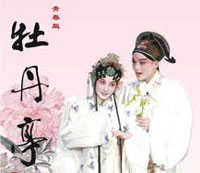CIIC:Today's featured article/July 16, 2015
The great classical stage art of Kunqu is an ancestor of Peking Opera that first became popular in the 16th century. Kunqu was to remain China's dominant national theatrical form for some 300 years, and although it lost its place as the nation's preeminent form of theatre with the rise of Peking Opera, a number of Kunqu troupes still perform regularly. They not only stage the great classics and create new ones, but they also make imaginative adaptations of some of those time-honored pieces. The Shanghai Kunqu Troupe's production of The Peony Pavilion is one of these.
The Peony Pavilion (牡丹亭), written in 1598, has long been considered the greatest Kunqu opera of all time. Its author was Tang Xianzu, who lived from 1550 to 1617. A native of Jiangxi Province, Tang was widely recognized as a man of immense learning, yet he failed to thrive as a government official. Exile, demotion and poverty marked his official career, but he left behind five Kunqu operas, among them The Peony Pavilion. (More...)
